ISLAMABAD: The price of solar panels has plummeted by over sixty percent in Pakistan in recent weeks due to bulk imports from China because of lower rates, importers said this week, with more consumers switching to the renewable source of power to reduce electricity bills.
The cost of producing solar panels in China, which accounts for about 80 percent of global consumption, plummeted by 42 percent in the last year, giving manufacturers there an enormous advantage over rivals in places like the United States and Europe. Multiple European solar manufacturers have announced plans to close factories in recent months, under price pressure from Chinese imports. China accounts for 80 percent of solar module production capacity after years of subsidies.
Pakistan has ideal climatic conditions for solar power generation, with over nine hours of sunlight in most parts of the country. Utilizing just 0.071 percent of the country’s area for solar photovoltaic (solar PV) power generation would meet Pakistan’s electricity demand, according to the World Bank.
But currently, only 5.4 percent of Pakistan’s installed power generation capacity of 39,772 megawatts comes from renewables like wind, solar and biomass, while fossil fuels still make up 63 percent of the fuel mix, followed by hydropower at 25 percent, according to the National Electric Power Regulatory Authority (NEPRA).
But this may change with an acute drop in the price of panels, importers said.
“A solar plate of 580 watts that I bought [last year] for 75,000 rupees [$270] has dropped to 25,000 rupees [$90] now,” Muhammad Yahya, a solar importer in Islamabad, told Arab News on Thursday. “That means it’s one-third of [earlier price].”
“The rates of the inverters are the same and keep fluctuating, but the main thing is solar panels and the rates of the solar panels are now 33 percent lower.”
Prices of solar panels dropped in China following import curtailment from major buyers including India, US and Europe while the Pakistani government had abolished a 17 percent sales tax to encourage solar imports, Yahya said, explaining the reduction in panel prices:
“People who would import through illegal channels, they [the government] blocked them, this helped stop the illegal import, and led to a bulk import, and secondly the rates [of solar panels] have dropped in China.”
Another solar panel importer in Islamabad, Abdul Moiz, agreed that the rate drop in China and curtailment of imports to India and other major buyers had led to bulk imports to Pakistan.
“America and India have stopped their imports [from China], that’s why the majority of the imports are now directed toward Pakistan,” Moiz told Arab News.
“CLIMATE CHANGE”
Despite the benefits, including to the environment of zero carbon emissions from solar panels, Pakistan is far behind in meeting its goal of shifting to 60 percent renewable energy by 2030 with 50 percent reduction in projected emissions.
Experts say procedural and bureaucratic delays in construction approvals and unattractive tariffs for selling power to the national grid coupled with a lack of political will and little government investment had blocked the progress of the solar industry in the past. For households, a big impediment, before the Chinese rate cuts, was the steep initial investment.
But that has changed, with electricity consumers describing the drop in solar panel prices as a ‘big relief’ in reducing their electricity bills.
“After its [solar panel] installation, our [electricity] cost has reduced to thirty percent,” Imran Ali Gul, a manager at a local hotel who has installed a 16kw system, told Arab News. “That’s why we preferred to get the solar system installed.”
Aamir Hussain, chairman Pakistan Alternative Energy Association, told Arab News Pakistanis purchased and installed solar panels of around 1800 megawatts last year, which was expected to jump to 3,000 megawatts this year due to the lower prices of the panels and increased customer demand.
“Pakistan will be spending over $3.5 billion [this year] on solar panels imports only as this doesn’t include import of batteries, inverters and other auxiliary items,” Hussain said. “Pakistan needs to follow consistent policies regarding renewable energy to meet its national and international obligations for the greenhouse gas emissions.”
Experts also said Pakistan, one of the most vulnerable nations to climate change impacts, needed to swiftly move to end its reliance on fossil fuels.
“There is no denying of the fact that climate change has wreaked havoc globally, so the studies suggest that in order to meet the global targets of reducing our temperature etc, in addition to transition of existing fossil fuel power plants, we should cap these fossils as well,” Manzoor Ahmed, a researcher at the Policy Research Institute for Equitable Development in Islamabad, told Arab News.
“So, given this roadmap, given our commitments in terms of net zero emissions or COP conferences where we agreed to meet global targets, we have no choice but to shift to renewables and we must do it.”
Demand for solar power rises in Pakistan as import glut crashes panel prices
https://arab.news/wju6g
Demand for solar power rises in Pakistan as import glut crashes panel prices
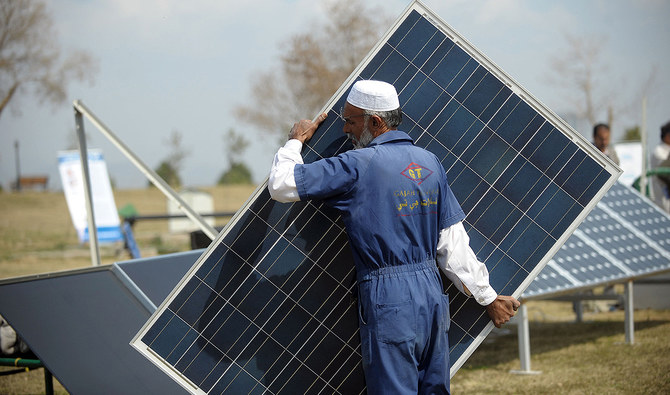
- Businessmen say solar panel prices have dropped by over sixty percent due to bulk import, rate cuts by China
- Islamabad currently only generates around five percent of its energy from renewable solutions like solar power
Ex-PM Khan party reiterates call for judicial probe into May 2023 violence in Pakistan
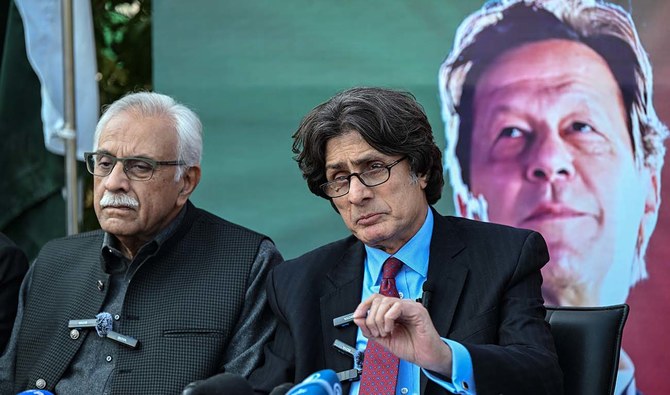
- Khan’s brief arrest on May 9, 2023 saw hundreds of his supporters allegedly ransack state buildings and vandalize public property
- A Pakistani military spokesman on Tuesday said it was important to punish May 9 perpetrators to restore trust in the justice system
ISLAMABAD: Jailed former prime minister Imran Khan’s Pakistan Tehreek-e-Insaf (PTI) opposition party on Tuesday reiterated its call for a judicial probe into violent protests that hit Pakistan on May 9, 2023 over Khan’s brief arrest in a graft case.
Khan’s arrest saw hundreds of his supporters allegedly pour into the streets across the country, ransacking military and other properties. Thousands were arrested in the aftermath and some were tried by military courts after the authorities promised to bring the perpetrators and instigators of the violence to justice.
The PTI says the May 9 incident was a “false flag operation” and the subsequent crackdown was aimed at keeping Khan, who was ousted from power in a parliamentary no-trust vote in April 2022, and his party from returning to power in Pakistan’s national election held in February this year, after being delayed for months.
Asked about the claims, a Pakistani military spokesman said on Tuesday the May 9 incident was not related to the military alone, but to the whole of Pakistan, noting that the protesters had attacked military installations, burnt the residence of the founder of Pakistan and vandalized martyrs’ monuments.
The spokesman, Maj-Gen Ahmed Sharif Chaudhry, said the perpetrators and facilitators of the riots needed to be brought to justice as per the constitution and law of the land to preserve the credibility and faith in the country’s justice system.
“See, all this what he has said, we challenge him on these things that all what he is saying, its proofs should be brought before the people,” Raoof Hasan, the PTI information secretary, said at a press conference.
“And the easiest way for that is, what we started demanding immediately after May 9, that an independent, transparent judicial inquiry be instituted, which established who committed the crime and who were behind them.”
Last week, the PTI also issued a circular and urged party members to hold rallies in every provincial assembly constituency to commemorate the May 9 protests, citing directives from Khan who has been in jail since August last year.
Khan, 71, was ousted in 2022 after falling out with Pakistan’s powerful military leaders who many say backed him into power in 2018. In opposition, he waged an unprecedented campaign of defiance against the military establishment which has directly ruled the South Asian nation for nearly half of its history.
Arguably Pakistan’s most popular politician, Khan says the cases against him are “politically motivated,” aimed at keeping him from returning to power. The military denies it.
Pakistani conglomerate Engro looks to go global, main investor says
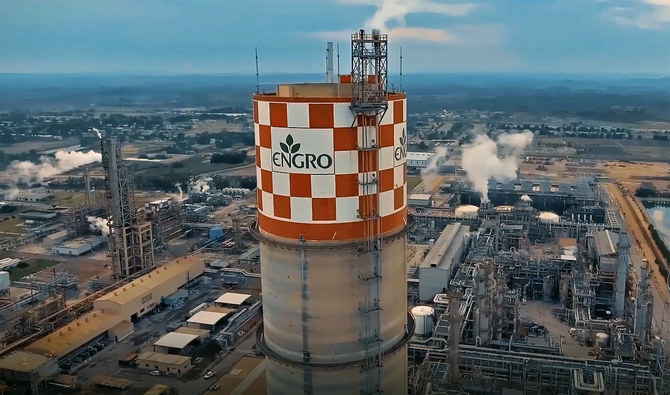
- The expansion plans include looking at telecom infrastructure in the Middle East, North Africa, and Central Asia
- Engro Corp. has a market capitalization of $694 million on the Pakistan Stock Exchange and assets of $2.9 billion
KARACHI: Pakistan’s largest conglomerate, Engro Corp, is looking to expand into new markets, including the Middle East, Central Asia and Africa, the chemicals-to-energy company’s largest investor said on Tuesday.
Speaking to Reuters in a rare interview, Samad Dawood, vice chairman of Dawood Hercules Corp, which owns 40 percent of Engro Corp, said the company was also considering global liquefied natural gas (LNG) opportunities as well as hydrogen energy.
The expansion plans include looking at telecoms infrastructure in the Middle East, North Africa, and Central Asia, while it is looking at Africa to expand its fertilizer businesses, he said.
Engro Corp. has a market capitalization of 193 billion rupees ($694 million) on the Pakistan Stock Exchange and assets of 802 billion rupees ($2.9 billion), according to public data.
The group has businesses across multiple sectors in Pakistan, including energy, fertilizer, telecommunications and consumer goods.
It owns 56 percent of Pakistan’s first LNG terminal, Engro Elengy Terminal Pakistan, which was set up in the southern city of Karachi in 2015. Dutch energy logistics giant Royal Vopak owns the remaining 44 percent.
The terminal fulfils 15 percent of Pakistan’s natural gas demand.
Dawood said Engro will continue to invest in the energy sector despite having sold its coal-based assets, and was exploring new avenues for sustainable energy production.
He said the company was talking to technology providers in the hydrogen energy sector to figure out how to use ammonia as an energy transition solution.
Dawood added that Pakistan was far from being energy-secure and there were plenty of opportunities to invest further in the power sector.
Pakistan has moved toward reliance on LNG after its own domestic gas supplies dwindled fast as consumption in the industrial and residential sectors increased.
’DREAMER’
Dawood said the global push was inspired by his late elder brother Shahzada, who perished last year in the ill-fated Titan’s voyage to explore the Titanic wreckage — an accident that made global headlines when the deep-sea submersible imploded and killed all five people on board.
“He (Shahzada) was much more of a dreamer and pushing us to become more international and building that curiosity and engaging with the outside world,” Dawood said.
The Dawood family also faced a protracted legal ordeal in Pakistan where the company was accused of getting illegal favors from the government.
The case, which lasted years, finally ended last week with the country’s accountability watchdog dropping the case entirely. Dawood says the matter hurt the family deeply and even impacted their businesses and potential investors.
The company’s plans to push ahead are taking shape, Dawood said. On Monday, the boards of Engro and Dawood Hercules approved in principle a restructuring plan to allow them more capital flexibility.
Dawood said the restructuring will allow for participation in “opportunities that the entire economy provides,” adding that the boards wanted the flow of capital to be completely seamless between the two organizations.
He said Engro would be able to expand its investment mandate to include exploring opportunities created by multinational corporations divesting from Pakistan’s troubled markets.
Saudi Arabia’s Crown Prince expected to visit Pakistan ‘any time’ during May — FM Dar
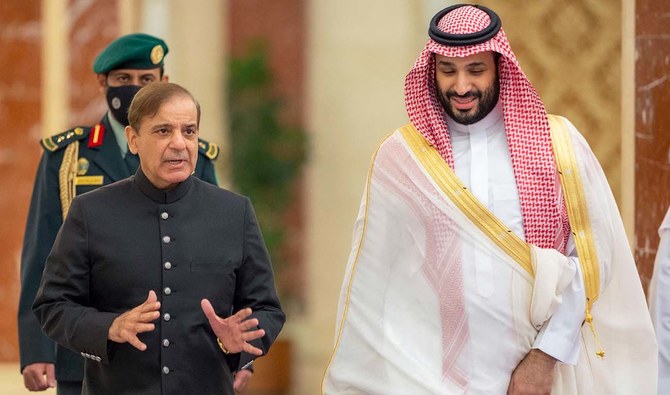
- The development comes after a flurry of high-level engagements between Pakistan and Saudi Arabia in recent weeks
- Both countries have been working closely to increase bilateral trade and investment in several diverse sectors
ISLAMABAD: Ishaq Dar, Pakistan’s deputy prime minister and foreign minister, on Tuesday said the much-awaited visit of Saudi Arabia’s Crown Prince Mohammed bin Salman to Islamabad was on the cards and could materialize “any time” during the month of May.
The statement follows a series of high-level engagements between the two countries, including the visits of Pakistan PM Shehbaz Sharif to the Kingdom and a visit of Saudi Foreign Minister Faisal bin Farhan to Islamabad.
The visit by the Saudi Crown Prince would mark his first trip to Pakistan in the last five years. His previous visit took place in February 2019 during the tenure of former prime minister Imran Khan.
“That visit [of Saudi Crown Prince] is due, which will happen any time during May,” Dar told reporters at a media briefing in Islamabad. “We will receive the final dates from there [Saudi Arabia] and as a foreign ministry, we are in touch and his visit as of now is on the cards.”
The Saudi Crown Prince accepted PM Sharif’s invitation to visit Pakistan during their meeting in Ramadan, according to Dar.
“He [Saudi Crown Prince] said that he will visit Pakistan after the initial government-to-government (G2G) and business-to-business (B2B) meetings,” the Pakistani foreign minister said.
Pakistan and Saudi Arabia have been working closely in recent weeks to increase bilateral trade and investment deals, with Crown Prince Mohammed bin Salman last month reaffirming the Kingdom’s commitment to expedite an investment package of $5 billion.
PM Sharif discussed increasing bilateral trade and investment in his meeting with the Crown Prince during Sharif’s visit to Saudi Arabia on April 6-8, according to Dar.
It was followed by the visit of a Saudi ministerial delegation, led by FM Prince Faisal, to Islamabad on April 15-16, during which Pakistan presented the Saudi delegation with an investment menu that was “meticulously prepared after extensive efforts.”
Following Sharif’s talks with the Crown Prince and other top Saudi officials in Riyadh, a 50-member, high-level delegation, led by the Kingdom’s Assistant Minister of Investment Ibrahim Al-Mubarak, arrived in Pakistan on Sunday to explore investment opportunities in the South Asian country.
“The Saudi Assistant Investment Minister has brought prominent private Saudi companies for B2B meetings as government could only involve in major projects such as Reko Diq, petrochemicals and mining,” he said, adding that his government had aligned Pakistani companies for matchmaking.
“While bilateral trade volume will be bolstered through the private sectors of both sides, the government will facilitate this process as demonstrated by our recent efforts.”
Dar said Pakistan’s future looked “promising” due to the rapid progress made on the bilateral trade and investment agenda, on the directives of the Saudi Crown Prince.
Pakistan and Saudi Arabia enjoy strong trade, defense, and cultural ties. The Kingdom is home to over 2.7 million Pakistani expatriates and serves as a top source of remittances to the cash-strapped South Asian country.
‘Wide potential’: Pakistani PM invites Japanese industrialists to invest in electric vehicle industry
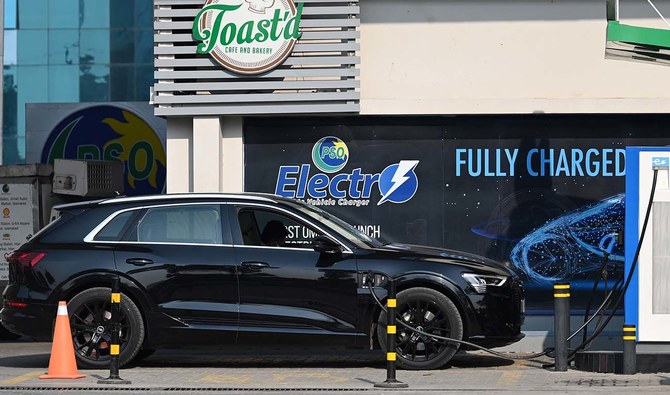
- The delegation, led by Japan’s Ambassador Wada Mitsuhiro, met PM Shehbaz Sharif to discuss various opportunities in Pakistan
- PM Sharif says his government has formed committee to resolve issues faced by Japanese firms expanding businesses in Pakistan
ISLAMABAD: Prime Minister Shehbaz Sharif on Tuesday met with a delegation of Japanese industrialists in Islamabad and urged them to invest in Pakistan’s electric automotive industry, Sharif’s office said, amid country’s push to attract foreign investment.
The delegation, led by Japan’s Ambassador to Pakistan Wada Mitsuhiro, met the prime minister to discuss various opportunities in Pakistan, according to PM Sharif’s office.
The Pakistan premier noted that Japan and Pakistan were longstanding friends and the two countries should further promote trade and investment ties in various sectors.
“There is a wide potential for investment in the electric vehicle industry in Pakistan and Japanese companies with the best technology can take full advantage of it,” Sharif was quoted as saying by his office.
“All problems faced by Japanese industrialists and businessmen will be overcome together.”
He noted that his government had formed a committee to resolve the issues faced by Japanese companies, who were expanding their businesses in Pakistan.
During the meeting, the Japanese ambassador informed the prime minister about the arrival of a delegation of 20 well-known Japanese companies to Pakistan in July, which would prove to be an important milestone for the promotion of investment and trade between the two countries.
“The delegation informed the Prime Minister that Japanese companies have started local production of hybrid vehicles in Pakistan,” Sharif’s office said. “The Prime Minister welcomed this move.”
The development comes amid Pakistan’s efforts to attract foreign investment to keep the frail $350 billion South Asian economy afloat.
The cash-strapped nation last month completed its $3 billion International Monetary Fund (IMF) program which helped avert a default last year, but the government of PM Sharif has stressed the need for a fresh, longer-term program.
Pakistan is expected to seek at least $6 billion and request additional financing from the Fund under the Resilience and Sustainability Trust.
PM Sharif says Saudi business delegation’s visit to benefit Pakistan’s economic future
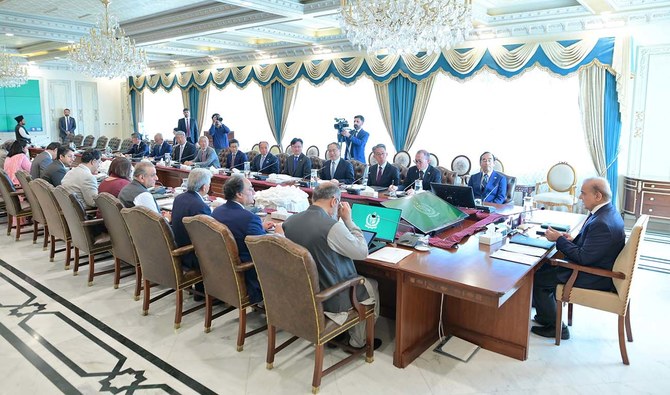
- The prime minister says the Saudi minister leading the delegation described it as ‘a new era’ for Pakistan
- Pakistan is seeking foreign investment to navigate a path to economic recovery as it seeks another IMF bailout
ISLAMABAD: Prime Minister Shehbaz Sharif expressed confidence on Tuesday the Saudi business delegation’s visit to Pakistan would prove beneficial for his country while applauding his cabinet ministers for playing a constructive role in their dealings with the visiting investors.
The delegation, which comprised representatives of 30-35 Saudi companies, was led by the kingdom’s Saudi Assistant Minister of Investment Ibrahim Al-Mubarak and arrived in Pakistan on Sunday.
Its members held several business-to-business meetings to explore investment opportunities in various economic sectors of the country.
The prime minister said in the opening remarks of the cabinet meeting the delegation was satisfied with its engagements in Pakistan before returning to the kingdom. He particularly mentioned the head of the delegation, saying he praised the performance of Pakistani ministers.
“He said, ‘We are very satisfied and happily returning.’ And he said, ‘I will report that we have seen a new era in Pakistan.’ In this, the commerce minister has a very big role, as does the ministers of petroleum and finance,” the PM told the cabinet meeting.
“It augurs very well for our future,” he added.
The kingdom’s business delegation’s visit to Islamabad followed Saudi Foreign Minister Prince Faisal bin Farhan’s visit to Islamabad last month, when he was briefed by the authorities on various avenues to invest in the country.
Pakistan is trying to navigate a path to economic recovery by securing an International Monetary Fund bailout.
It also needs foreign investment to help fight a chronic balance of payments crisis.










